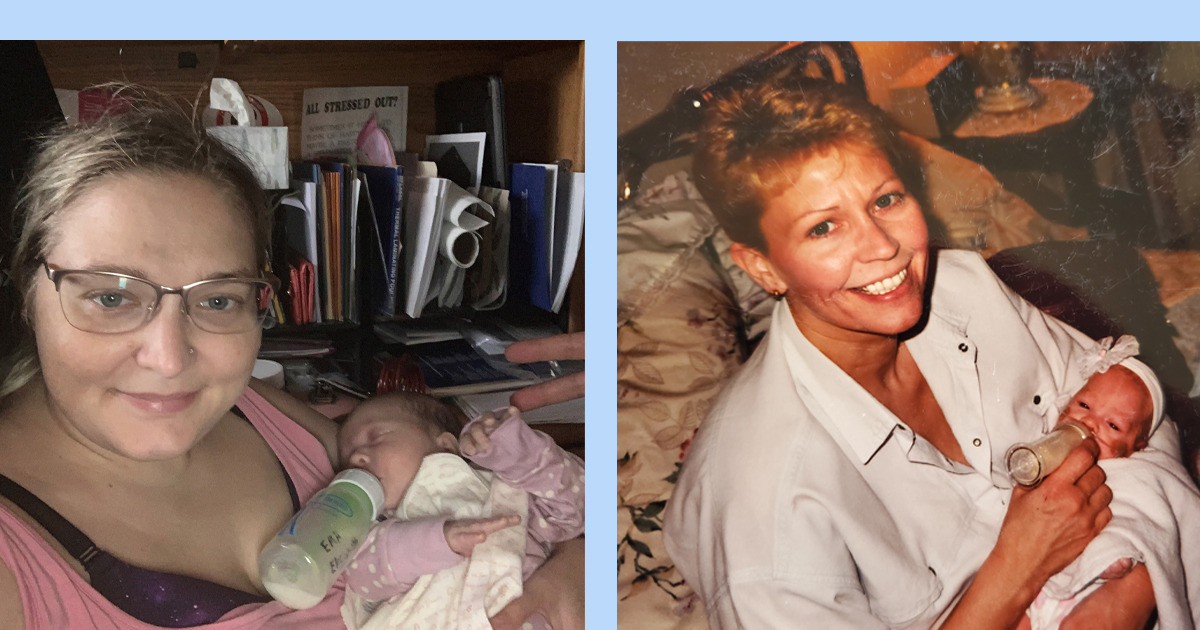For some women, achieving natural conception, maintaining a viable pregnancy to term and delivering a healthy baby isn’t always an easy feat.
For Deb Morgan, her daughter Lucy was nothing less than a Christmas miracle. In 1990, after several attempts at pregnancy that ended in miscarriage, Deb, a registered nurse for more than 12 years at that time, was referred to Phoenix Perinatal Associates, part of the Mednax® family. After consulting with Deb and conducting a series of tests, one of the practice’s maternal-fetal medicine (MFM) specialists discovered that her progesterone levels were too low to support a sustainable pregnancy.
A progesterone regimen, which kept her uterus from contracting during pregnancy, resulted in Deb finally conceiving and carrying a baby. However, low progesterone levels weren’t the only issue. Deb, an asthmatic, was diagnosed with preeclampsia during her pregnancy, which can lead to many health conditions, such as high blood pressure, brain injury, impaired kidney and liver functions, pulmonary edema and seizures. As a result, Deb was put on bedrest at 26 weeks gestation.
“Phoenix Perinatal Associates identified early in my pregnancy, my high risk for preeclampsia and preterm labor,” said Deb. “It was managed with early bedrest, home management of baby activity monitoring and emotional support by my physician and his nurse, Irene. Quick response to any calls I had made me feel safer.”
Many high-risk expectant mothers experience preterm labor, and Deb was no exception. On Christmas Eve in 1990, at 28 weeks gestation, Deb went into labor. After 10 hours, Lucy was born early Christmas morning, weighing 920 grams (slightly over 2 pounds). Unlike many newborns, however, she wasn’t going home any time soon. Instead, she would spend 63 days in the neonatal intensive care unit (NICU).
It was there they discovered Lucy had some considerable health issues. She was diagnosed with hydrocephalus, an excess of fluid in the brain and spinal cord, which may have contributed to her subsequent diagnosis of cerebral palsy. To help drain the excess fluid, a ventriculoperitoneal (VP) shunt was inserted into Lucy’s head when she was nine days old, which would be replaced every five years for the rest of her life. During her stay in the NICU, Lucy continued to reach the necessary milestones and was finally able to go home with her family.
For the Morgan’s and Phoenix Perinatal Associates, the journey didn’t stop there. Fast forward three decades and baby Lucy is all grown up with a baby of her own. Like her mom, Lucy, who is also asthmatic, was classified as a high-risk expectant mother due to her cerebral palsy and VP shunt. Following Deb’s footsteps, she was referred to Phoenix Perinatal Associates to manage her complex pregnancy.
Something very different than Deb’s experience, however, is that Lucy would carry her baby during the COVID-19 pandemic. Cerebral palsy put her at a much higher risk of becoming severely ill should she contract the virus. Therefore, extra precaution had to be taken.
“Wearing a mask all the time made it difficult to breath sometimes,” said Lucy. “That, and I could only have one person attend my appointments and delivery.”
At 30 weeks gestation, Lucy required more rest because she developed generalized edema (swelling of hands, legs, feet and face), increased fatigue and headaches. She also began to show protein in her urine.
“My MFM specialist, Dr. Michael Leovic, and Cindy, a registered nurse for the practice, took really good care of me,” said Lucy. “And 13 days before my baby was due, my labor was induced to help protect both of us given my high-risk status combined with preeclampsia.”
While her intentions were to have a natural delivery, an emergency c-section was performed, and baby Elizabeth arrived on Aug. 21, weighing a healthy 6.1 pounds. Unlike her mom, Elizabeth didn’t have a prolonged NICU stay. Instead, she was discharged from the hospital just five days after her debut.
The medical conditions Lucy has lived with since birth hasn’t stopped her from realizing her dreams of becoming a mom. Elizabeth didn’t arrive on Christmas day, but she is the best gift Lucy could have received.
The miracle of life happens every day. For some, it’s a much easier road, while others, such as Deb and Lucy, require special medical intervention. As for mom and daughter both landing at the same perinatal practice 30 years apart, Lucy said, “They helped create me, and they helped create Elizabeth. For that, we are grateful.”
Want to learn more about prematurity awareness month or preterm babies? Check out our other related articles:
Leading the way for advancements in neonatal care
Caring for NICU babies: It takes a village
Five ways Graham’s Foundation provides support for premature infants
NNP cares for babies in the NICU, while the NICU cares for her preemies
